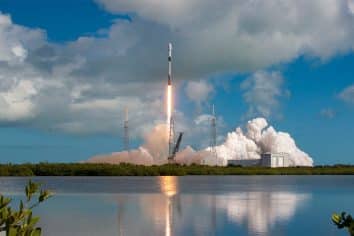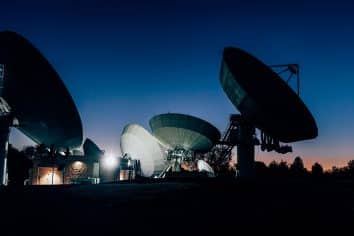Satellite Technology Vital to Delivering Affordable Connectivity and Driving Future Innovation, Intelsat CEO Tells Senate Committee
Luxembourg, 25 October 2017 – Intelsat S.A. (NYSE: I) (“Intelsat” or the “Company”), operator of the world’s first Globalized Network and a leader in integrated satellite communications, announced that Chief Executive Officer Stephen Spengler today appeared before the U.S. Senate Committee on Commerce, Science and Transportation (the “Committee”), to deliver prepared remarks and answer questions from Chairman John Thune, Ranking Member Nelson and Committee members regarding the commercial satellite industry and next-generation services impacting consumers.
Answering questions during a session entitled “The Commercial Satellite Industry: What’s Up and What’s on the Horizon,” Mr. Spengler discussed Intelsat’s next-generation satellite technology and the future of the satellite industry. He highlighted the critical role that satellite technology plays in providing disaster relief, rural telecommunications infrastructure, enabling connected cars and broadcast programming to millions of American every day.
In his testimony to the Committee, Mr. Spengler said, “This is an exciting time for the satellite industry. Given the insatiable demand for affordable connectivity, everywhere and at all times, satellite is converging with other telecommunications technologies to build one common telecommunications infrastructure. At a time when access to secure and reliable communications impacts everything from the economy to national security, Intelsat is playing a major role innovating our nation’s infrastructure.”
Mr. Spengler commented, “We are also very proud to partner with the U.S. military to bring the nation’s soldiers, sailors, airmen and Marines the critical communications capabilities they need to successfully carry out their mission around the globe and here at home, in the sky, in the sea, and on the ground. Whether it’s manned or unmanned aerial vehicles, communications on the move, or social and recreational welfare, Intelsat satellites carry the signal for our military and our troops.”
On the topic of Intelsat’s innovative initiative to share C-band spectrum, Mr. Spengler said, “We all know that with this ubiquitous connectivity demand comes a relentless demand for access to more spectrum. Spectrum is key to all communication services – satellite included. Intelsat has recently taken a leadership role on an initiative that could bring more reliable and faster broadband services to millions more Americans. In response to a recent FCC proceeding, we have proposed a market-based solution that would pave the way for joint use of C-band radio spectrum. This spectrum is highly prized for both satellite television distribution and 5G wireless services. Adoption of our proposal would provide our broadcast and cable programmer customers, as well as the satellite sector, necessary certainty with respect to continued quality, use of, and investment in this band.”
Mr. Spengler’s full written testimony submitted to the Committee is available here.
In addition to serving as CEO of Intelsat, Mr. Spengler is a Commissioner of the United Nations Broadband Commission for Sustainable Development.
About Intelsat
Intelsat S.A. (NYSE: I) operates the world’s first Globalized Network, delivering high-quality, cost-effective video and broadband services anywhere in the world. Intelsat’s Globalized Network combines the world’s largest satellite backbone with terrestrial infrastructure, managed services and an open, interoperable architecture to enable customers to drive revenue and reach through a new generation of network services. Thousands of organizations serving billions of people worldwide rely on Intelsat to provide ubiquitous broadband connectivity, multi-format video broadcasting, secure satellite communications and seamless mobility services. The end result is an entirely new world, one that allows us to envision the impossible, connect without boundaries and transform the ways in which we live. For more information, visit www.intelsat.com.
Intelsat Safe Harbor Statement
Statements in this news release, including statements regarding the Exchange Offers and the Consent Solicitations, constitute “forward-looking statements” that do not directly or exclusively relate to historical facts. When used in this release, the words “may,” “will,” “might,” “should,” “expect,” “plan,” “anticipate,” “project,” “believe,” “estimate,” “predict,” “intend,” “potential,” “outlook,” and “continue,” and the negative of these terms, and other similar expressions are intended to identify forward-looking statements and information.
The forward-looking statements reflect Intelsat’s intentions, plans, expectations, anticipations, projections, estimations, predictions, assumptions and beliefs about future events and are subject to risks, uncertainties and other factors, many of which are outside of Intelsat’s control. Important factors that could cause actual results to differ materially from the expectations expressed or implied in the forward-looking statements include known and unknown risks. Known risks include, among others, market conditions and the risks described in Intelsat’s annual report on Form 20-F for the year ended December 31, 2016, and its other filings with the U.S. Securities and Exchange Commission and risks and uncertainties related to our ability to consummate the Exchange Offers and the Consent Solicitations.
Because actual results could differ materially from Intelsat’s intentions, plans, expectations, anticipations, projections, estimations, predictions, assumptions and beliefs about the future, you are urged to view all forward-looking statements with caution. Intelsat does not undertake any obligation to update or revise any forward-looking statements, whether as a result of new information, future events or otherwise.
# # #
Media Contact: Dianne VanBeber Vice President, Investor Relations and Corporate Communications +1-703-559-7406 Contact DianneRelated Posts

News Release
Intelsat Appoints Gaurav Kharod as the Regional Vice President of Asia Pacific February 06, 2023



